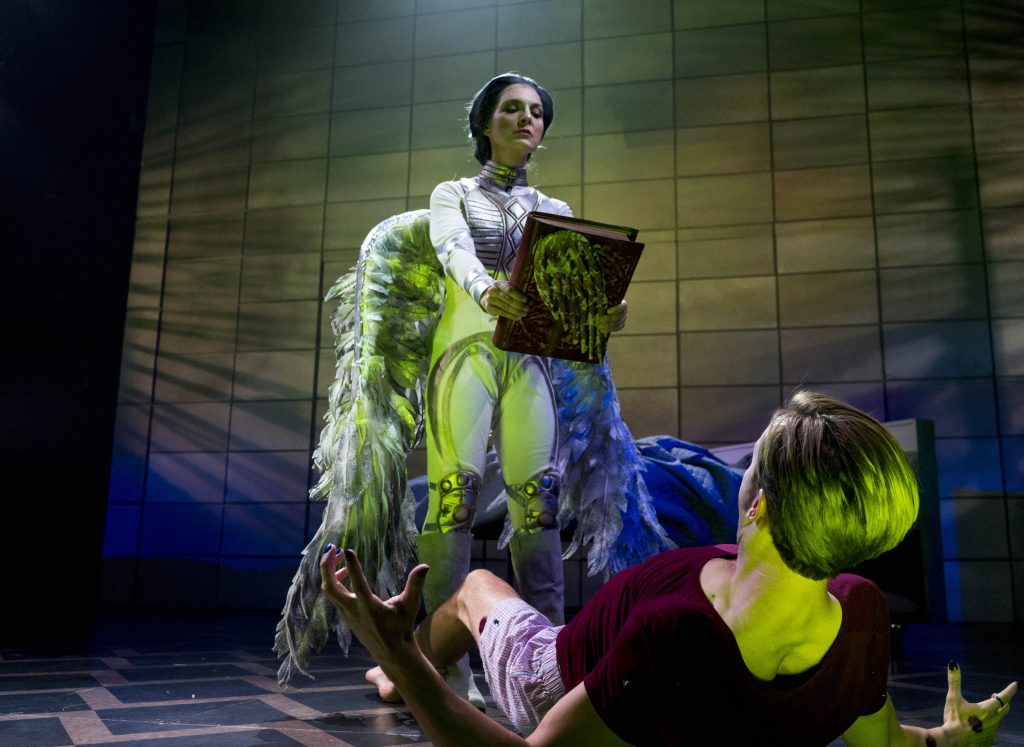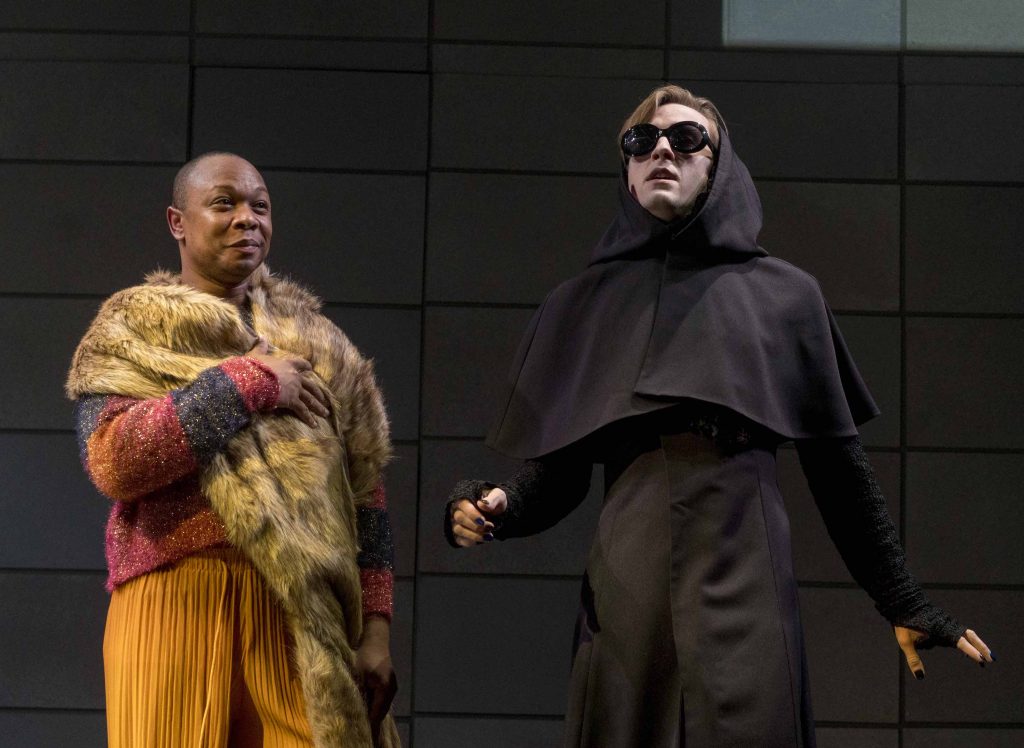Cygnet’s Transcendent ‘Perestroika’ Exceeds Promise of ‘Millennium Approaches’
“Perestroika,” the title of the second play in Tony Kushner’s encompassing drama Angels in America: A Gay Fantasia on National Themes, is a term that describes the wrenching social and political changes that happened in the Soviet Union prior to its demise. But Kushner’s play charts, at times in excruciatingly exhaustive detail, changes or even the possibility of change in the lives of individuals. Kushner continues the saga of his curiously intertwined cortege of characters from the first play, “Millennium Approaches,” intensifying their anger and confusion, interspliced with angelic interventions that escalate their anger and deepen their confusion.

Debra Wanger & Alex Bodine [photo (c.) Daren Scott Photography]
In “Perestroika,” the AIDS-stricken Roy Cohn turns his death scene into an extended virulent cabaletta, reduced to the company of individuals he openly hates, his black male nurse Belize and the apparition of Ethel Rosenberg. Gay Republican lawyer Joe Pitt leaves his wife Harper for a desperate fling with Louis, who, in a fit of buyer’s remorse over his new partner’s right-wing political past combined with his own guilt for abandoning Prior Walter, casts Joe off to attempt reconciliation with Walter, who struggles valiantly on his terrifying trip on the descending AIDS escalator. Needless to say, Prior Walter does not welcome Louis with open arms.
Joe’s mother from Salt Lake City, Hannah Pitt, takes up residence in the Manhattan Mormon Visitors Center, where she has also ensconced Harper Pitt, recently returned from her “voyage” to Antarctica. And, true to Kushner’s title, the great winged Angel appears to Prior Walter, giving him knowledge and challenges too great for him to bear.
Even with these shifting, complex relationships—which I have sketched in overly concise terms for the sake of a coherent review—Kushner finds ample time to elaborate the National Themes promised in his subtitle. Kushner incarnates his tirade on obscene political power wielded by morally bankrupt individuals in the person of Roy Cohn, realized by James Newcomb in “Perestroika” with astonishing, nightmarish power that even surpasses his brilliant characterization of Cohn in “Millenium Approaches.” Confined to his hospital bed and his omnipresent I-V, Newcomb commanded not just the stage, but the entire theater with the hurricane force of his impassioned delivery. Like a cornered, wounded wild animal, Connor Sullivan’s Joe Pitt lurched powerfully through his scenes, both emotionally and physically. Watching his external world view crash and burn around him—that squeaky clean, impeccably groomed Mormon diorama of suburban family normalcy to which he can never return—his pained facial expression and cracking voice vividly communicated his internal moral implosion.
As the anointed prophet of AIDS to a nation living in denial of the existence of the disease, Alex Bodine’s Prior Walter effused a strange elixir of hope and desperation, stalking the stage fired by the playwright’s agitprop anger over his country’s callous idiocy. Kevane La’Marr Coleman’s judiciously tempered portrayal of Belize helped me understand his character as Kushner’s terrestrial angel, tending both Prior Walter and Roy Cohn with an otherworldly equanimity that barely conceals the righteous anger of a prophet from the Hebrew Bible.
Rachel VanWormer deftly modulated her pill-popping, delirious Harper Pitt into a wise-cracking, truth-telling, arms akimbo court jester to the Mormon Visitors Center, over which Hannah Pitt presides as a crutch to distract her from her son’s descent. Rosina Reynolds’ prim Hannah Pitt hovered between sternly brandishing the absolute tenets of her Mormon faith and revealing a mother’s palpable fear of losing contact with her only son. Reynolds’ startling composure as Ethel Rosenberg counterbalanced Newcomb’s acrid Roy Cohn without so much as her lifting a finger. And her recitation of the Kaddish when Cohn dies in his hospital bed evoked a tender solemnity that eerily stilled the Old Town Playhouse.

Kevane La’Marr Coleman & Alex Bodine [Photo (c.) Daren Scott Photography]
Kushner gives the Angel a more prominent role in “Perestroika,” and Debra Wanger’s Angel displayed the authority and superhuman force this biblical messenger requires. Chris Rynne’s dramatic lighting and Sound Designer Steven Leffue’s thunderclaps heralded each angelic appearance with bravura efficiency. Isaac Kalimo and Hans Krueger accomplished all their challenging heavy lifting with ease, and for a change I mean that quite literally. They sleekly lifted the Angel from place to place on stage in upright position as if she were flying.
Andrew Hull’s giant wall of a set from “Millennium Approaches” fits “Perestroika” equally well, but with an added advantage. When it came time for the Mormon Visitors Center daily diorama show, the center sections of the wall swing open to reveal the Mormon pioneer diorama. And the vivid pastels (yes, that is possible!) of Shirley Pierson’s costumes provided ample visual compensation for Andrew Hull’s stark minimalist set.
Cygnet Theatre has turned the modest size of its stage and venue into a stunning advantage. With such incisive direction and overpowering acting, Cygnet’s production opens up Kushner’s massive two-part play in such a powerful way that the audience feels they are part of the interactions they are witnessing. The stage disappears–we are absorbed into the cast: the angels are appearing to us with equal challenge and devastation.
Cygnet Theatre opened “Angels in America, Part 2: Perestroika” in the Old Town Theatre, 4040 Twiggs St., San Diego, on March 24, 2019. It will run in repertory with “Angels in America, Part 1: Millenium Approaches” through April 20, 2019.
